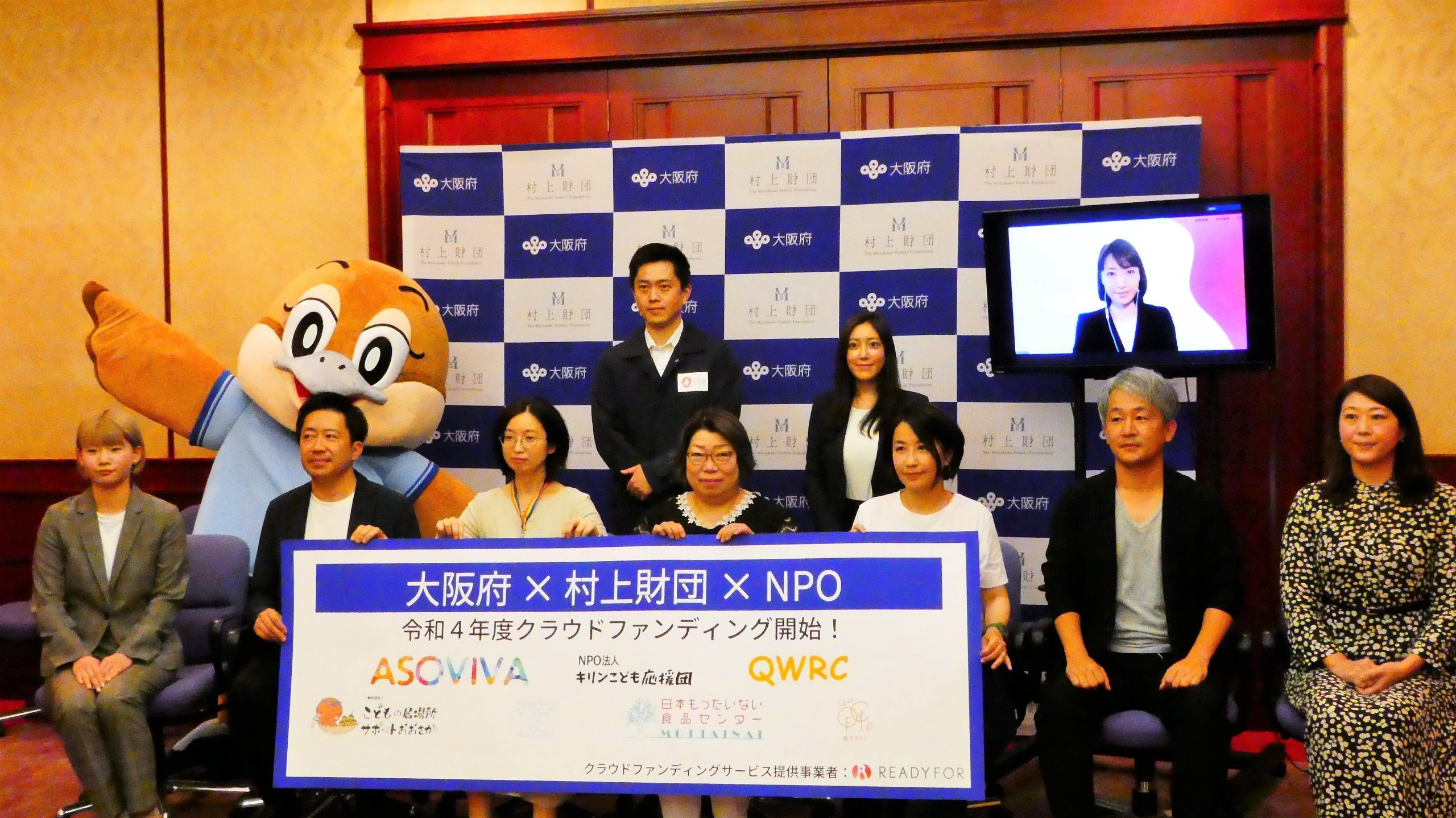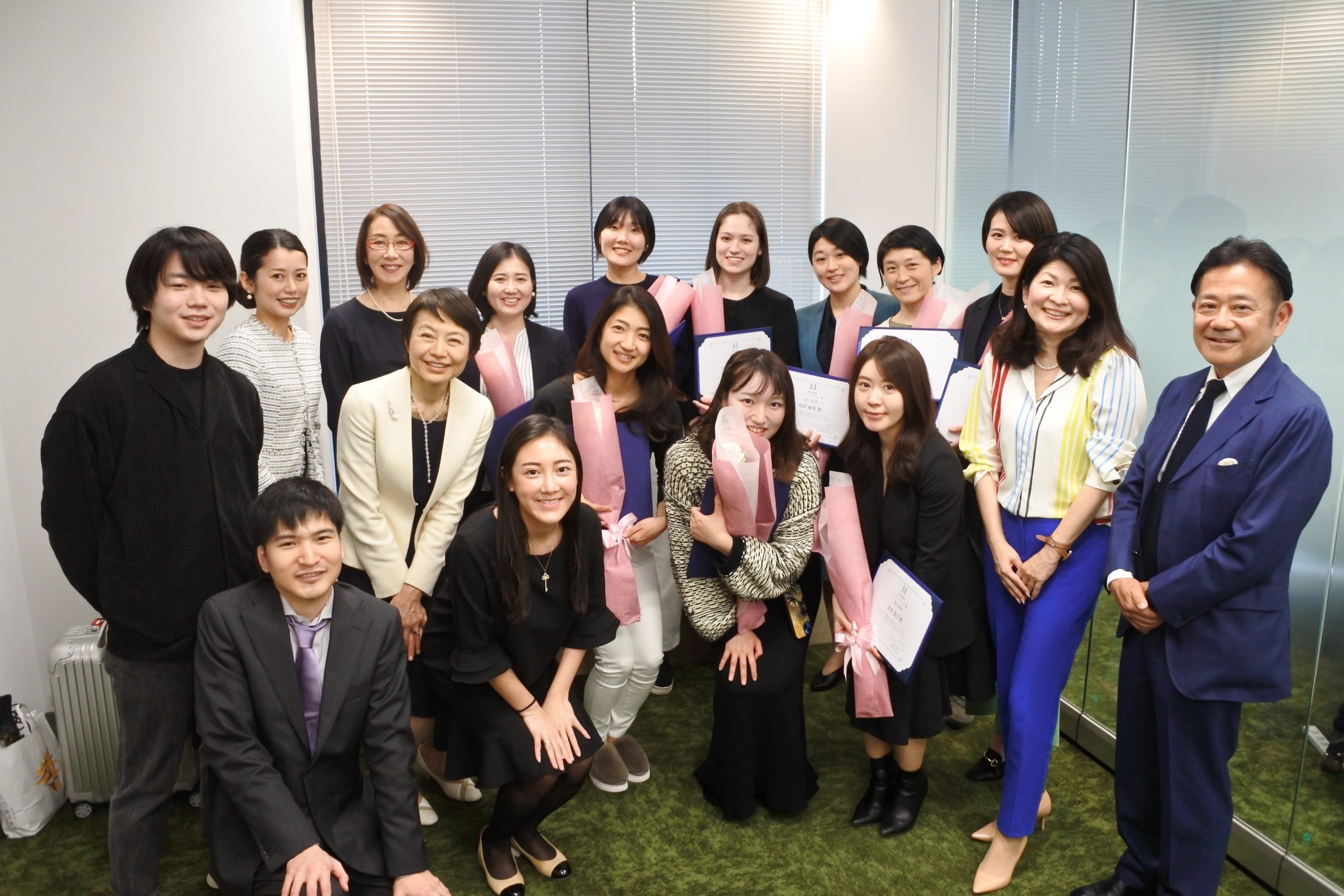Despite being the world’s third-largest economic power, Japan ranks low on the global gender equity index. Rei Murakami believes that the gender gap in politics is one of the root causes of numerous social issues in Japan since female politicians tend to prioritise policies that have a direct impact on constituents’ lives, such as education, family policy, and social welfare.
Born in 1994, Rei is the President of the Murakami Family Foundation, which was founded by her father, Yoshiaki Murakami in 2017. Through the introduction of Yuko Koshiba at the Japan Social Innovation and Investment Foundation, I had the opportunity to sit down with Rei in Tokyo and learn the story behind the initiative she launched to encourage and support young females to enter politics and make a positive impact on their communities. In the interview, we also discussed Rei’s views on the transition of generations in the philanthropy sector in Japan.
Fan Li: Can you tell us briefly why your father decided to start the foundation? When and why did you take over?
Rei Murakami: When he started in 2017, he’d actually been involved in philanthropy for 10 years. He started an NPO charity platform in 2007 which provides information on Japanese NPOs for more transparency, with the end goal of increasing the culture of donation in Japan. But he wanted to be more of a player and to involve his family, so he started the Family Foundation in 2017. We donate to Japanese NPOs mainly working on poverty in general and child poverty in particular, and women’s working environment and education. At the time, my sister was the president, but she moved to Singapore and she has three children. I was working for Mitsubishi and after that, I was at INSEAD, but I have always been very interested in philanthropy because when my father started Charity Platform, I and my other siblings and my mom would get involved in the volunteer work. That started my interest in philanthropy, which grew when I was studying abroad and in 2021 or 2022, we started to talk about how we were going to divide the family business between an investment segment and a philanthropy segment, and I suggested I should take over the foundation.
Was there a moment that changed your perspective on social issues and made you interested in the social sector?
I think one of the changing moments is when I was in grade 6. I went to do volunteer work for Green Bird, an NPO that gets young people to pick up garbage in the Shibuya and Harajuku area. That area was somewhere that I would go with my friends and hang out, but I suddenly saw it from a different side – there is a social issue there, with people throwing garbage and no one taking care of it. After that, I went to a high school in Canada which ran a soup kitchen once a month for homeless people. They were people with a lot of problems and, when you were serving the food, they’d often be crying, but they would still thank me and the emotion that you get when you do something like that is very fulfilling. So those experiences made me want to make a social contribution.
Your father is an expert on investing and finance and one of the main projects your foundation supports is finance education for children. Is there a lack of such education for kids and young people in Japan?
A lot of people know he – my father – was arrested for insider trading and there’s a culture of thinking that investment is a sketchy business in Japan so parents and teachers tend to not talk about money and finance to children, but right after university, you suddenly have to earn a living and I think there’s a very big gap where people are not very educated about money and investing. So I think my father thought he could teach kids about finance. Back then there was nothing like that, but later the Ministry of Finance actually suggested it and there’s a lot of courses now, even in public schools. I think the culture is changing now.
One of the reasons that Alliance wanted to interview you is because of your new project, the Public Leaders Academy, which is to encourage women to enter politics. Could you tell us what motivated you to start it?
When I joined the foundation last year in January, I did a lot of interviews with the NPOs that we support and what I heard especially from the big organisations, is that there’s a gap in policy implementation on social issues, so many of them are keen to do policy advocacy. But for them to do that effectively, they need a supporter who is a politician and many of the politicians who champion their advocacy work are women. The data also says that female politicians tend to be more interested in policies that are closer to the constituents’ life – education, family policy, social welfare and so on – but only 10 per cent of Japan’s House of Representatives are women, and I feel like that’s the root cause of a lot of social issues in Japan. And we also support NPOs working on child poverty, which really comes from the poverty of single parents and they’re mostly women. I feel like a lot of the social issues we face can be solved when we have a more diverse parliament, that’s why I started thinking about the gender gap in politics and that tackling it might help solve some of our problems.
Are there already some results from the Leaders programme?
While the program is to encourage women entering politics, it’s not from any partisan position. What I’m doing is really supporting women, especially younger generation women, because the younger generation is very underrepresented as well in Japan. So, there’s nothing very political about it. It’s more like social activism. One of the things that happened in the beginning is that I was started to be interviewed by the media. That helped to some extent to help people see the issue and that there are those who are trying to change it – and there’s a lot of news about how Japan is ranked bottom of the gender equality index, so a lot of people now view this as an issue, especially when you compare the situation with other countries. Media exposure and raising awareness is an initial success. In the longer term, obviously, we want to see a lot of women who joined the programme actually running for election and becoming politicians.
I’m quite hopeful because our generation thinks in a different way, we act differently and even consume differently. There’s more desire among the younger generations to be part of social change.
We just finished the first cohort on 11 March. We had 20 people in the cohort and four of them are actually running for election in April. Obviously, we don’t know the results yet but it’s a good sign that we were actually challenging, and we will have another cohort this year, starting the programme in September. Year by year, we will develop a bigger community of young females who want to become leaders, who can share their difficulties and support each other. and I would really like to see a lot of people running for election from there. But it will definitely take a lot of time.
The four you mentioned, did they want to run for election before joining the programme or did they just have a very broad interest on politics and after the programme, decided to run?
The first cohort is quite interesting. Some of those who are running have actually run before, so they always had a very strong desire to get into politics and then of the rest, there are some who are still working for corporates who are not involved in politics but who have an idea that they want to be politicians in the future. And in between there are people who have just started thinking about running so they have been in contact with the party that they’re interested in and looking for a seat that they can run for.
What was the experience of those who had run before? What challenges had they faced?
Last year, the leading party recruited some women candidates at the last minute to reach the quota of 30 per cent of women candidates. However, because it was last minute, some of them could not receive full support from the party and most of them lost in the election. Those who lost in the election joined our programme and despite the struggle, two of them decided to run for the election again. I think a lot of women feel like they don’t get to run for the seats where they can be successful and, in Japan, after you lose in an election, it’s very difficult to find a job because you’re viewed as someone who lost in the elections but who, at the same time, is very politically opinionated.
In a recent podcast featuring interviews with congresswomen from different parties, it was noted that although there are an increasing number of female representatives in Congress and Parliament, younger female politicians still feel hesitant to speak up. While these women are being encouraged to voice their opinions, the broader issue remains that young women across the country are not being adequately encouraged to speak up. They often find themselves in a learning and observation role.
Looking at the broad issue of gender equality in Japan, are there any other philanthropists working on this issue, and what recommendations would you have for others looking to get involved?
There’s a small group among a generation of women in their 50s and older who are very strong, and those are the ones who created the path for the younger female generation. They often try to act like men because that’s what they needed to do. So there is no actual role model for young women today. Ultimately, not just in politics, but also in business, we have very low female involvement and there is still a lot of gender bias where women are supposed to act in a specific way and that’s still there in our generation. It’s changing but slowly. You can make changes in the system, you can implement quota systems, for example, but, in the end, there’s still this gender bias which can only be changed by education.
There is a rising trend of investing in diversity and equality in the Asia region, including funding for improving women’s status. Do you see this happening in Japan as well?
I am now based in Singapore, where many investors have mandates for a certain percentage of female founders or management or for companies to be environmentally friendly. This is very strong because it forces companies to change. But in Japan, it’s a bit slower. For example, Kathy [Matsui], general partner of MPower Partners, who is involved in our programme is a pioneer in ESG investing, but big corporations and banks don’t have many mandates for diversity. They are starting to focus more on climate change, but not so much on diversity.
…there’s a culture of thinking that investment is a sketchy business in Japan so parents and teachers tend to not talk about money and finance to children, but right after university, you suddenly have to earn a living and I think there’s a very big gap where people are not very educated about money and investing.
In NPOs, we have a high number of females and I think we can raise awareness because a lot of NPO presidents, me included, appear in the media. It’s really about advocacy and raising awareness from our side because one of the reasons Japan is so slow to change is because of the seniority system. The decision-makers incorporates or government are the older generation, they still have a lot of stereotypes. We may have to wait until the older generation retires to see some change.
Globally, we are seeing a significant shift in the way younger people engage with philanthropy, whether they are those with financial means or those who are more focused on activism. Do you see this same next-gen transition happening in Japan?
Again, when I compare it to other countries, it’s a bit slower but it’s definitely happening. Especially during Covid-19. People were facing difficult situations, they needed support and the government was panicking and was very slow to react, so, there was a great need for the philanthropic sector to support these people. NPOs began to make more use of technology because, before, a lot of the support they gave was face-to-face, but some of the NPOs evolved to make more use of technology. One of the examples I really like is a nonprofit called Anatano Ibasho. They give psychological support to people who might commit suicide, they use Line app and they work mostly online. They even use AI to answer to inquiries that they receive right away, because the waiting time is very dangerous for at-risk people. They have become very big over the past three years.
Does your foundation support Anatano Ibasho?
I wanted to donate to them, but they didn’t need it because they have a lot of funders, including the government because the government cannot approach this issue and now they’re trying to work together to design a system which can support people who might commit suicide. The founder is in his early 20s, so this is a very interesting example of the new generation evolving.
We are thinking of including LGBTQ people in the leaders’ programme because, while it was designed for women, I’m more interested in diversity, not just from the male-female perspective.
I’m very close to him and to some of the other NPOs who have young founders because there’s a small community of younger-generation NPO leaders. On the funding side, as opposed to the activist side, I don’t see anyone else who is already the second generation. Usually, your parents are still in the decision-making role, and I don’t know what’s going to happen to the next generation. I’m quite hopeful because our generation thinks in a different way, we act differently and even consume differently. There’s more desire among the younger generations to be part of social change. So once the decision-making role is transferred to the second generation, we might see some family foundations with a young president active in the philanthropy world.
As you mentioned, young people see things differently and act differently. However, for the society and system to change, a power shift is necessary. If this shift is happening relatively slowly in Japan, what do you think young people can do to speed up the transition? Or how can they prepare themselves for when the opportunity arises?
I think one of the things that the younger generation can do is to disrupt the older generation – bringing new technology and new ideas to fight against them and I think that’s really happening especially in the for-profit companies. For the younger generation, there’s no border between for-profit and non-profit because people consume differently, and a lot of them, even businesspeople want to be part of social change. One person I’m very close to is the founder of PoliPoli. What they’re trying to do is democratise policymaking, so they have a platform where anyone can propose a policy. They also provide consultancy services for the government, the municipalities and the business sector. The founder has a very clear vision of social change, but his company is still for-profit.
The other thing that I feel is that maybe we need to convince the older generation that It’s a nice legacy to retire early, so that they feel comfortable and they feel respected when they leave and they’re leaving a great success story behind. That’s something I think the media should take up.
Have you ever tried with any senior people?
I’m trying with my father first. [Murakami laughs]
I understand that your foundation chose not to register as a foundation with tax exemption status.
It gives us more freedom to do what we believe is good for society. When you go for the tax benefit, there are a lot of restrictions. With the leaders’ programme, for example, I think it would be very difficult to address an issue that is close to politics rather than completely non-profit.
Does the Murakami Foundation have calls for proposals or an application process?
We don’t have open applications. We hear about an NPO, we meet them and then we decide. One of the things we look at is, when we donate $1, how much can they bring in per dollar? How much impact can they have? It doesn’t have to be numerical, but we try to choose non-profit organisations that can effectively use the donation to have more impact on society.
Your foundation is addressing important issues like gender equality and financial education. What else do you think are the pressing issues of today’s Japan that philanthropy can or needs to play a bigger role in?
One of the things we are already supporting, child poverty, is a very big issue, especially in Japan. The children are the next generation and many families are really facing poverty right now and a lot of people don’t know much about it.
Could you explain a little more for our readers because they might be surprised to hear about child poverty in Japan?
Japan has the highest child poverty rate out of all the OECD countries, because single parents especially tend to be very poor. They don’t get enough food and they don’t get proper education. This has become a pretty big issue and it’s something that we really need to address, and from the policy advocacy side as well. There should be a law to protect single parents to make sure they are receiving money from the other partner who’s not raising the child, because that person can work, but the mother or the father cannot. There’s less protection in Japan compared to Western countries. Also, the focus with the gender gap tends to be on that between men and women, but in Japan, LGBTQ people are facing a difficult situation. That’s something that we need to change as well.
Is your foundation going to do anything on that issue in the near future?
We are thinking of including LGBTQ people in the leaders’ programme because, while it was designed for women, I’m more interested in diversity, not just from the male-female perspective. We’ve actually donated to a non-profit organisation that supports LGBTQ people, so they can provide help and counselling and connect people with each other, but I think we need more focus on that.
Going back to the child poverty issue, your foundation has recently established a partnership with local government to support child canteen, a community-based facility that provides affordable meals for children, particularly those from low-income families in Japan.
Yes. We’ve been working with Osaka Prefecture over the past three years. NPOs apply to them and the ones that they choose do crowdfunding, and the Osaka prefecture provides PR, so there’s a lot of transparency and trust accruing to both sides. Whatever the amount they raise from crowdfunding, we match, and we’re going to continue for the next three years. Also, one of the organisations we supported directly was child canteen. How it works is that they get food free from supermarkets and restaurants which is still edible, and then they take it to different child canteens. I think it was a very good project, a sort of last-mile organisation.
Apart from matching the funds they raise, do you also have a say in the process of choosing which organisation will receive the money? Or does the Osaka government decide that?
Our foundation staff Mr Miyamoto is a member of the evaluation group.
You, your father and your whole family have a very strong link with overseas but so far, your projects are 100 per cent focused on Japan. Do you have any plans to expand to working regionally or will you continue to focus on domestic issues in Japan?
We will focus on domestic issues, but we would be very open to exchanging opinions and doing a project where partners can help each other. I would definitely be open to doing something with other funders in different countries, and maybe donating to social issues outside of Japan, but so long as there was mutual benefit to each other and some kind of synergy between the countries.
Fan Li is the East Asia Regional Representative at Alliance magazine.









Comments (0)